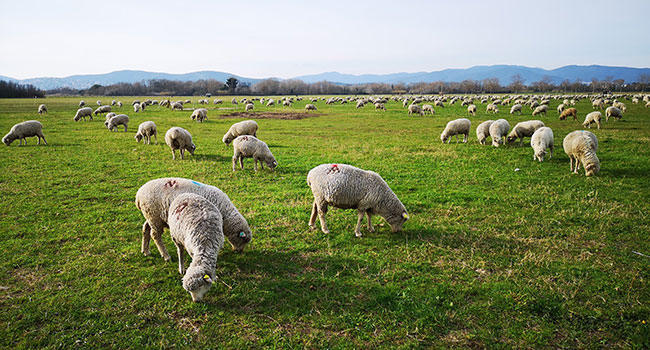 Jessica Grenke |
“We looked at the effects of livestock grazing on every continent except Antarctica and what it means for biodiversity,” said Alessandro Filazzola, lead author on the study and a Killam and Natural Sciences and Engineering Research Council (NSERC) post-doctoral fellow under the supervision of professors Jens Roland and JC Cahill in the Department of Biological Sciences.
“Livestock grazers consume the plants where they are found, which could have effects that trickle up the food web, such as reducing food resources for herbivores.”
The researchers compiled thousands of papers and more than 100 datasets comparing areas where livestock graze to areas without livestock. The results suggest decomposers benefit from grazing, but many other animal groups are negatively affected.
The researchers explain that livestock could have replacement effects – filling the role of natural herbivores – which can reduce vertebrate abundance or invertebrate diversity. The decline of these herbivores can in turn negatively affect predatory animals, which were also lower in abundance on grazed sites.
The researchers also found that pollinator species such as bees, flies, beetles and butterflies were less diverse on grazed land.
“Our finding that the diversity of pollinators decreased under grazing was quite striking, illustrating that some species can be particularly vulnerable,” said Filazzola. “Taken all together, our findings highlight that groups most closely linked with plants are the ones most affected by grazing.”
Research in this field has typically been restricted to a single trophic level – such as predators, herbivores or omnivores – due to the complexity of examining how grazing affects many layers of the food web. By drawing on results from more than 100 studies, the team was able to construct a more complete picture of the impact on biodiversity.
“This research opens a window into understanding the multi-faceted nature of grazing effects on the environment,” said study co-author Jessica Grenke, a PhD student under the supervision of Cahill.
“Our results highlight the importance of considering complex ecosystem responses to grazing within a management context. The global scope and huge scale of our work also allow us to generalize the effects of the presence of grazing in a way that simply hasn’t been possible before.”
The study, The Effects of Livestock Grazing on Biodiversity Are Multi‐trophic: A Meta‐analysis, was published in Ecology Letters.
| By Andrew Lyle, with files from Sean Townsend
Andrew is a reporter with the University of Alberta’s Folio online magazine. The University of Alberta is a Troy Media Editorial Content Provider Partner.
The opinions expressed by our columnists and contributors are theirs alone and do not inherently or expressly reflect the views of our publication.
© Troy Media
Troy Media is an editorial content provider to media outlets and its own hosted community news outlets across Canada.



